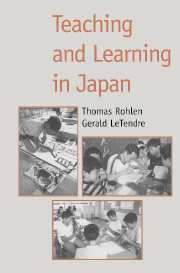Book contents
- Frontmatter
- Contents
- List of contributors
- Introduction: Japanese theories of learning
- Section I Fundamental approaches
- Section II The emotional foundations of early learning
- Fostering social and intellectual development: the roots of Japanese educational success
- “… And Tomoko wrote this song for us”
- Honoring the individual
- Section III School and classroom models
- Section IV Path and guidance
- Section V Artistic pursuits – old and new
- Conclusion: themes in the Japanese culture of learning
- References
- Index
Fostering social and intellectual development: the roots of Japanese educational success
Published online by Cambridge University Press: 05 June 2012
- Frontmatter
- Contents
- List of contributors
- Introduction: Japanese theories of learning
- Section I Fundamental approaches
- Section II The emotional foundations of early learning
- Fostering social and intellectual development: the roots of Japanese educational success
- “… And Tomoko wrote this song for us”
- Honoring the individual
- Section III School and classroom models
- Section IV Path and guidance
- Section V Artistic pursuits – old and new
- Conclusion: themes in the Japanese culture of learning
- References
- Index
Summary
When schools care about children, children care about schooling.
Thomas SergiovanniRecently, I interviewed a group of Japanese elementary teachers who had toured American elementary schools. They were eager to share with Japanese colleagues several features of American elementary education they had just observed: multicultural curricula; integration of computers into classroom life; drama and role-playing used to help students understand history. Yet they were puzzled and troubled by other aspects of American elementary school life: ability grouping of children; discipline systems that put the names of misbehaving children on the blackboard for all to see; the ever-changing membership of elementary classes as students were pulled out or added for special activities, remedial help, or “gifted” education. Echoing the questions of dozens of other Japanese teachers I have interviewed over the past decade, they gently asked how the practices that struck them as so different from those in Japan – ability grouping, public rewards and punishments doled out by the teacher, variable class membership – affected the social fabric of elementary school life. “Don't American parents complain that ability grouping violates children's right to equal educational opportunity?” they asked. “Don't children in the low ability group feel like less valued members of the class?” “When children are publicly warned about misbehavior, aren't other children reluctant to be their friends?” “How do American teachers develop a feeling of ‘classhood’ when all class members and their teacher do not spend the whole day together?”
- Type
- Chapter
- Information
- Teaching and Learning in Japan , pp. 79 - 97Publisher: Cambridge University PressPrint publication year: 1996
- 3
- Cited by



